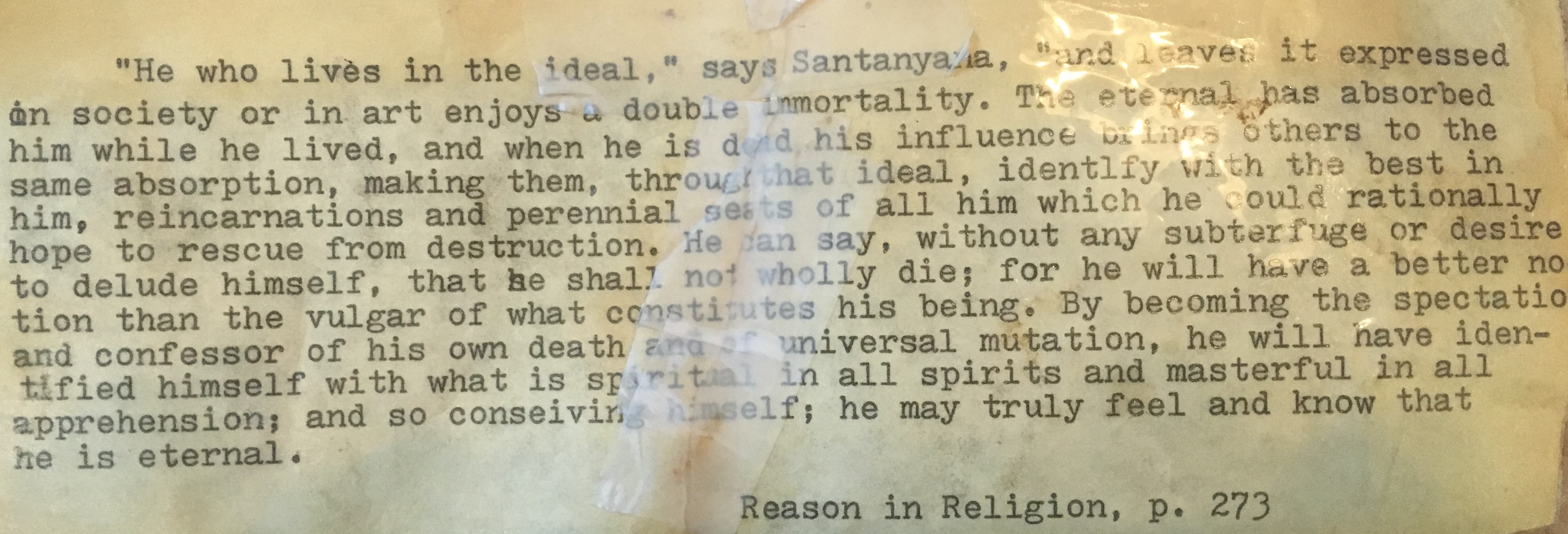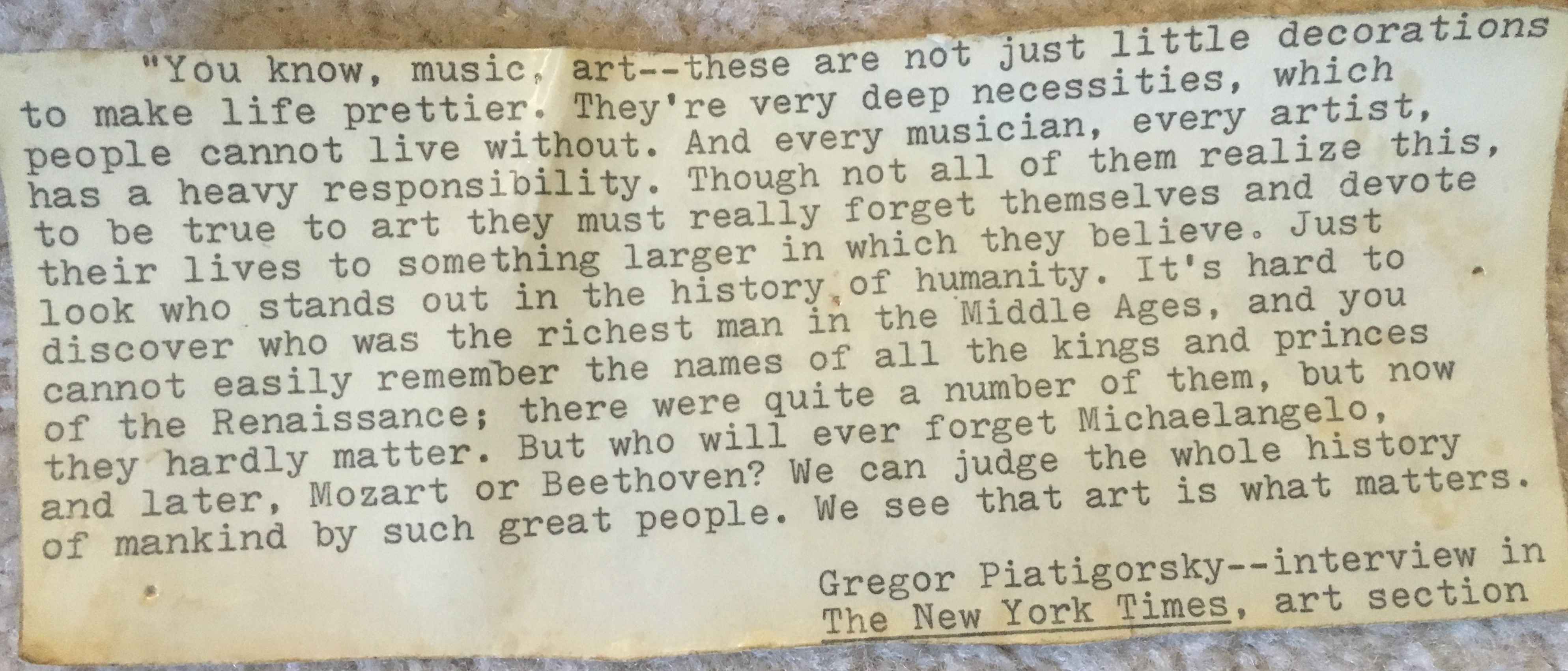MORE WORDS TO WRITE BY
A while back I shared some favorite quotations about writing, literature, and art that I’ve kept posted in my office for decades. I’ve printed and laminated these snippets whenever I find them since high school, and keep them taped to my desk drawers and file cabinets alongside a few pithy cartoons and family photos. Here I’ll share a few more favorites that have inspired, delighted, and consoled me over the years.
Art is What Matters
You know, music, art–these are not just little decorations to make life prettier. They’re very deep necessities, which people cannot live without. And every musician, every artist, has a heavy responsibility. Though not all of them realize this, to be true to art they must really forget themselves and devote their lives to something larger in which they believe. Just look who stands out in the history of humanity. It’s hard to discover who was the richest man in the Middle Ages, and you cannot easily remember the names of all the kings and princes of the Renaissance; there were quite a number of them, but now they hardly matter. But who will every forget Michaelangelo, and later, Mozart or Beethoven? We can judge the whole history of mankind by such great people. We see that art is what matters.” – Gregor Piatigorsky
C’mon, I’m a cellist, so I’m naturally a sucker for lofty statements like this by a great cellist like GregorPiatigorsky. Plus,I grew up on this kind of propaganda about art and the elevated, preiminent role of the artist. As I’ve grown older and wiser, I’ve come to question that stance, and recognize its provincial placein modern western intellectual history. I’ve also come to see its dangers to the psyche and have broadened my views on how one can live a meaningful life or leave a legacy. I also know that being noticed in your time or remembered after it aren’t necessarily desirable goals. Even so, when I’m fighting the barbarians who trivilialize or demonize art, or simply trying to understand why I bother trying to create it, this statement lifts my spirits and helps me carry on.
Writing for a Reader
One cannot help feeling that its guardians sometimes miss the point of literature, which is not to cut gems of flashing and exquisite rarity but to communicate, to convey a meaning, an art, a story, a fantasy, even a mystery, to someone. The writer must have a reader as the yin must have a ynag. Literature does not exist in a vacumm; indeed, if it is not read, like music without listeners, it cannot be said to exist at all. ” – Barbara Tuchman
This one cuts to the bone for us underrecognized writers. I often feel that my novels are the only thing I write purely for me, the one true thing. But that is delusion. If they are only for me, I have no need to write them because the purest thing exists uncut inside my head. If I feel a need to translate it into words, it is solely to share it with another sentient being. It doesn’t have to be a whole lot of sentient beings, and it doesn’t have to be shared or accessible forever. But it has to be shared.
Writing as a Form of Immortality
He who lives in the ideal and leaves it expressed on society or in art enjoys a double immortality. The eternal has absorbed him while he lived, and when he is dead his influence brings others to the same absorption, making them, through that ideal, identify with the best in him, reincarnations and perennial seats of all in him which he could rationally hope to rescue from destruction. He can say, without any subterfuge or desire to delude himself, that he shall not wholly die; for he will have a better notion than the vulgar of what constitutes his being. By becoming the spectator and confessor of his own death and of universal mutation, he will have identified himself with what is spiritual in all spirits and masterful in all apprehension; and so conceiving himself, he may truly feel and know that he is eternal. – George Santayana, Reason in Religion
Typos aside, I can see why this one inspired me when I was younger. Who wouldn’t want to create art with this pep talk by philosopher George Santayana (even with his name misspelled). The influence on others after death he describes is less compelling to me now than it was when I typed this at 15, and less credible, as Ozymandias makes abundantly clear. Even so, I still agree with the first part. Writing (and reading) are both activities that allow you to transcend time and space, and the limitations of individual existence.
Whatever I think about my own place in the artistic pantheon, moreover, the works and sentiments of George Santayana, Barbara Tuchman, and Gregor Piatigorsky are certainly still influencing me, as are those of so many others haunting my office and my mind. I’ll share more in months to come. Cheers.
Terra Ziporyn
TERRA ZIPORYN is an award-winning novelist, playwright, and science writer whose numerous popular health and medical publications include The New Harvard Guide to Women’s Health, Nameless Diseases, and Alternative Medicine for Dummies. Her novels include Do Not Go Gentle, The Bliss of Solitude, and Time’s Fool, which in 2008 was awarded first prize for historical fiction by the Maryland Writers Association. Terra has participated in both the Bread Loaf Writers Conference and the Old Chatham Writers Conference and for many years was a member of Theatre Building Chicago’s Writers Workshop (New Tuners). A former associate editor of the Journal of the American Medical Association (JAMA), she has a PhD in the history of science and medicine from the University of Chicago and a BA in both history and biology from Yale University, where she also studied playwriting with Ted Tally. Her latest novel, Permanent Makeup, is available in paperback and as a Kindle Select Book.
- Web |
- More Posts(106)
